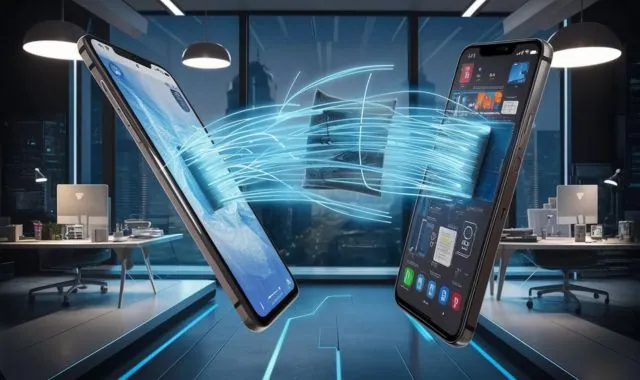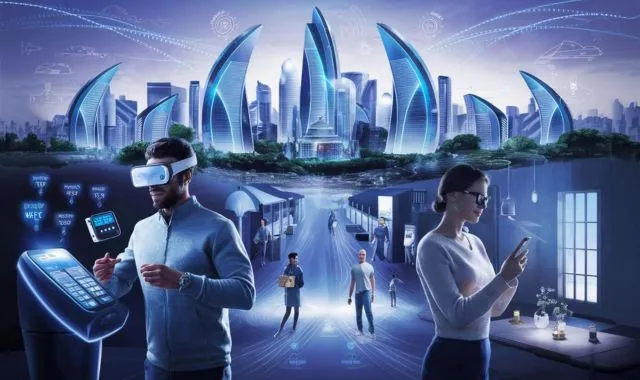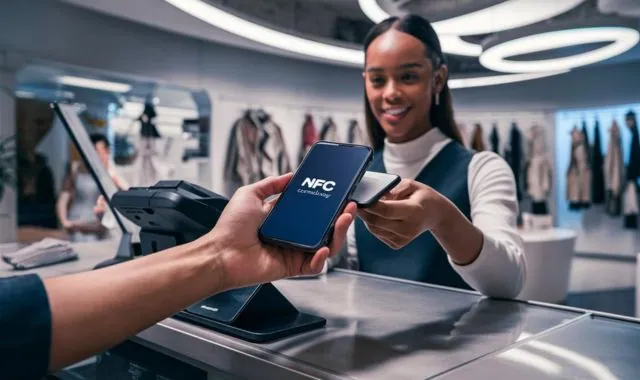Physical Address
304 North Cardinal St.
Dorchester Center, MA 02124
Physical Address
304 North Cardinal St.
Dorchester Center, MA 02124

NFC technology offers a convenient and secure way to tap and share data with your phone. From contactless payments to sharing files and even access control, NFC is transforming everyday interactions. Its secure short-range communication makes it a versatile tool for the future of smart cities and connected device.

NFC, or Near Field Communication, is a rapidly evolving technology transforming the way we interact with the world around us. This article delves into the world of NFC, exploring its functionalities, applications, and the exciting potential it holds for the future.
NFC is a short-range wireless communication technology that enables two devices to exchange data by simply touching them together. It operates within a few centimeters, making it ideal for secure and convenient data transfer.
NFC utilizes radio waves to establish a connection between devices. One device acts as the initiator, actively transmitting data, while the other acts as the target, passively receiving the information. This contactless exchange eliminates the need for pairing codes or physical connections.
NFC’s versatility extends across various aspects of our daily lives. Let’s explore some of its prominent applications:
NFC has revolutionized how we pay. By tapping your NFC-enabled phone or card against a compatible reader, you can make secure and speedy transactions, eliminating the need for cash or swiping cards.
Imagine posters that come alive with a tap! NFC-enabled smart posters can display additional information, launch videos, or even direct you to a website when tapped with your phone, creating a more engaging marketing experience.
The convenience of NFC extends to public transportation. Tickets can be stored on your phone and scanned using NFC readers at entry points, streamlining your commute.
NFC chips can be embedded in key cards or fobs, granting secure access to buildings, offices, or even hotel rooms with a simple tap, enhancing security and eliminating the hassle of carrying physical keys.
NFC simplifies data exchange between devices.
Share your contact details effortlessly by tapping your phone against another NFC-enabled device.
Quickly transfer photos, documents, or other files between NFC-enabled devices without needing an internet connection.
Establishing a Bluetooth connection can be a breeze with NFC. Simply tap the devices together to initiate pairing.
There are several compelling reasons to embrace NFC technology:
NFC transactions and data exchange are incredibly fast and effortless, saving you time and frustration.
NFC offers a secure way to transmit data, as the short-range communication makes it less susceptible to interception compared to other wireless technologies.
NFC devices require minimal power to operate, making them ideal for battery-powered applications.
NFC is generally considered a secure technology. The data transmission range is limited, making it difficult to intercept information. Additionally, NFC devices typically only transmit data when in close proximity and upon user activation.
The potential of NFC technology is vast and constantly expanding. Here’s a glimpse into what the future holds:
We can expect to see NFC integrated into various aspects of our lives, from loyalty programs and medical records management to smart home appliances and personalized shopping experiences.
NFC will play a crucial role in smart cities, enabling seamless interactions between citizens and their environment. It will also be instrumental in connecting devices within the Internet of Things (IoT) ecosystem, fostering automation and efficiency.

Ready to experience the convenience of NFC? Here’s how to get started:
Most modern smartphones and contactless payment cards come equipped with NFC functionality. Check your device’s specifications or consult the user manual to confirm.
Numerous apps leverage NFC technology. Explore app stores to discover applications that cater to your specific needs and interests
Advanced Use Cases of NFC:
Tap an NFC tag at a restaurant to leave a review or access exclusive offers.
Verify the authenticity of products by tapping your phone on an NFC tag embedded in the packaging.
Gain access to events or concerts by scanning an NFC ticket on your phone.
Unlock special features or content in games or interactive experiences by tapping an NFC tag.

NFC technology is rapidly transforming the way we interact with the world. Its convenience, security, and versatility make it a valuable tool for everyday use. As NFC continues to evolve and integrate into various aspects of our lives, we can expect even more exciting possibilities to emerge in the near future.
A: Check your phone’s user manual or specifications. You can also try searching for “NFC settings” on your phone. Most modern smartphones will have a toggle switch for NFC functionality within the settings menu.
A: No, using NFC is completely safe for your phone. It utilizes a minimal amount of power and doesn’t involve any physical contact that could cause harm.
A: Most mobile payment apps with NFC functionality offer security measures like requiring a PIN or fingerprint scan for authorization. Additionally, you can usually disable contactless payments remotely if your phone is lost or stolen.
A: No, NFC itself is not designed for location tracking. It facilitates data exchange within a short range and doesn’t have the capability to track a device’s location.
A: The NFC Forum (https://nfc-forum.org/) is a great resource for comprehensive information about NFC technology, its applications, and industry standards. You can also find helpful articles and tutorials online by searching for “NFC technology explained.”